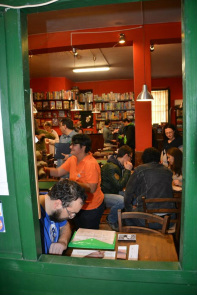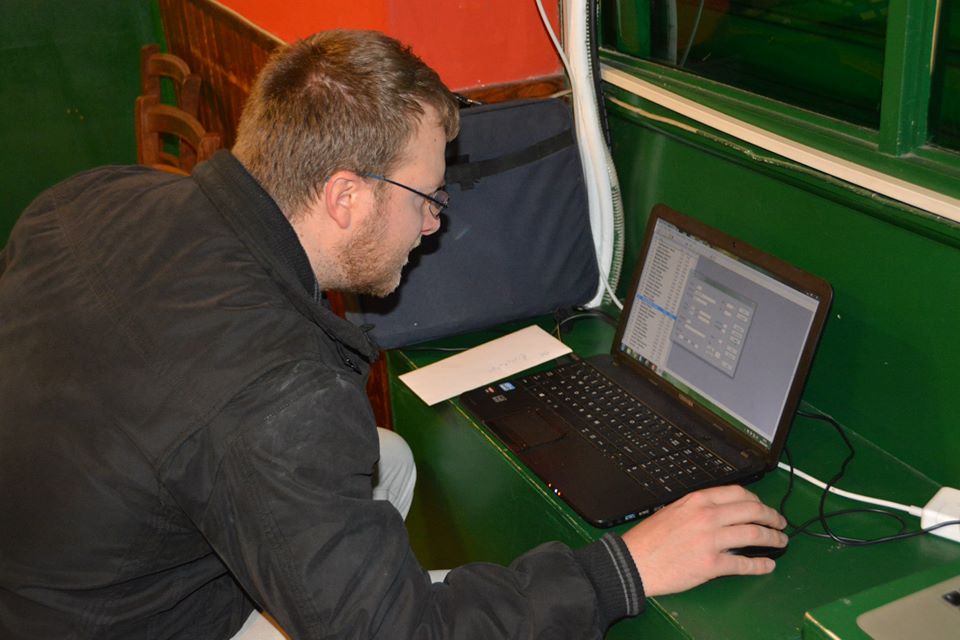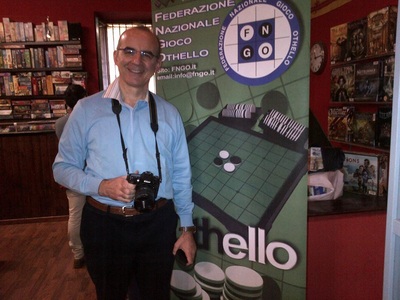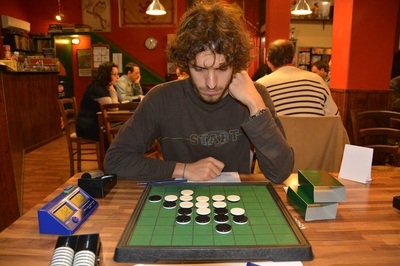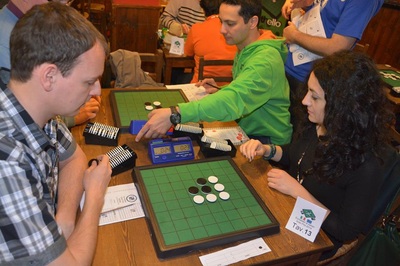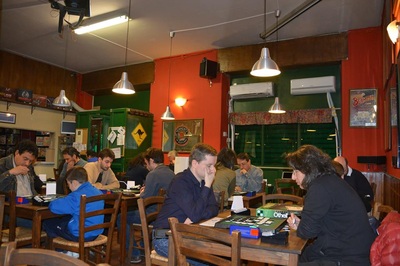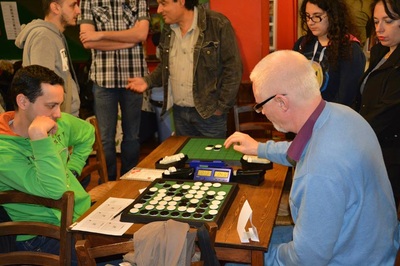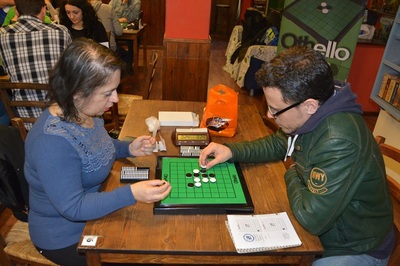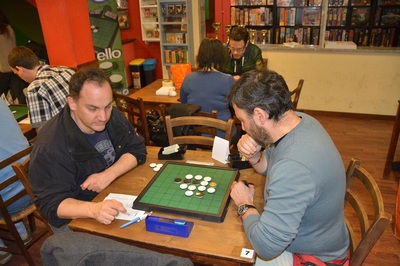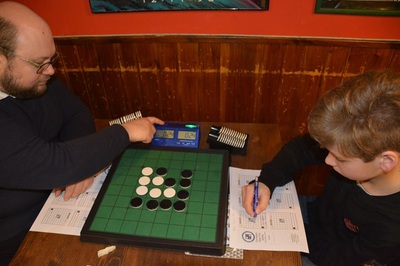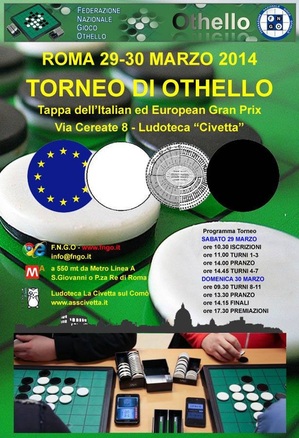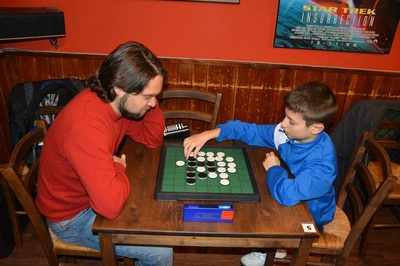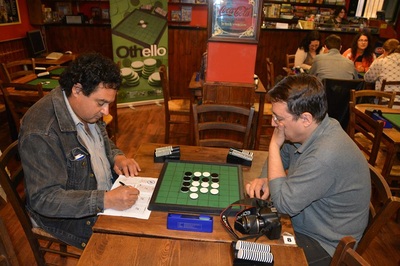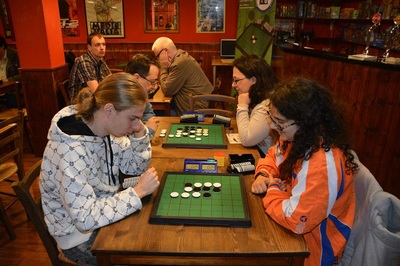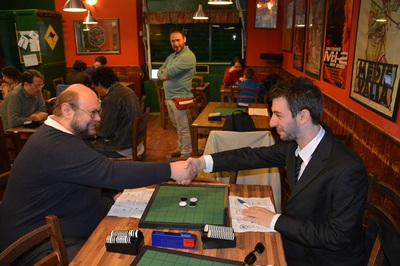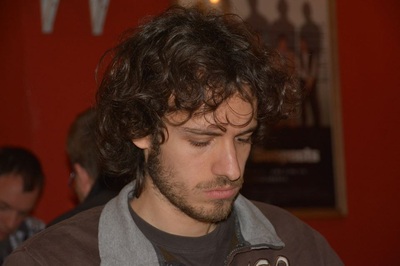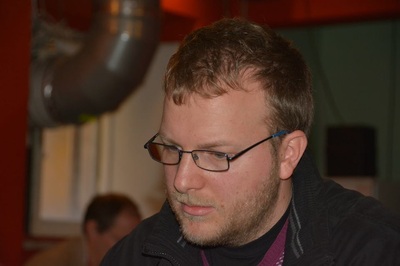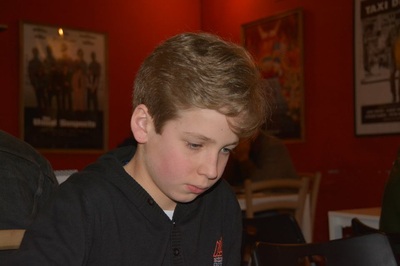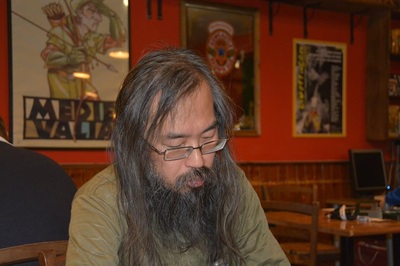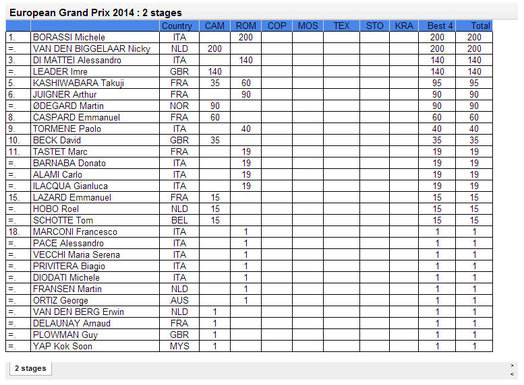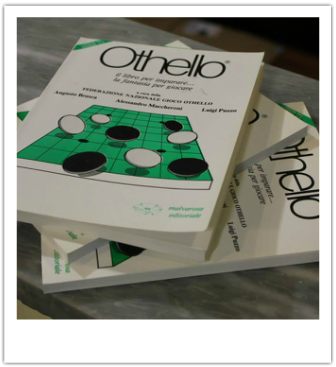European Grand Prix 2014 - Rome
winner: Michele Borassi
Takuji Kashiwabara played 100 European Grand Prix tourneys
read the interview at the bottom of this page
|
Dear Othello friends,
On March 29 - 30, the second stage of the European Grand Prix 2014 will be played in Rome, Italy. The tournament is also part of the Italian Grand Prix. Tournament format: 11 rounds Swiss system + final Number of players: 31 - 34 from beginners to masters. link to results EGP Rome 2012 More info on FNGO website FNGO FB photoalbum thanks to Biago Privitera who also made the 2 wonderful videos
|
On top of the list with 7 wins, Alessandro Di Mattei. The winner of EGP in Rome in 2012, Michele Borassi, lost 2 games as did a lot of the other favourites. Three losses for Takuji Kashiwabara, the 2013 EGP Champion. Michele Borassi lost to Francesco Marconi (round 3)and to Arthur in round 6. Arthur Juigner lost to Marc Tastet in round 4 and to Alessandro Di Matei in round 7.
Not present at this edition of the 2014 EGP the two finalists of the 2014 Cambridge EGP, Nicky van den Biggelaar and Imre Leader. All together not so many foreign players at this tournament. Three frenchmen, Takuji Kashiwabara, Marc Tastet, Arthur Juigner and only one Dutch player, Martin Fransen. The australian player George Ortiz, he lives in Italy for so many years now, I count him as Italian player
Not present at this edition of the 2014 EGP the two finalists of the 2014 Cambridge EGP, Nicky van den Biggelaar and Imre Leader. All together not so many foreign players at this tournament. Three frenchmen, Takuji Kashiwabara, Marc Tastet, Arthur Juigner and only one Dutch player, Martin Fransen. The australian player George Ortiz, he lives in Italy for so many years now, I count him as Italian player
Results after 7 rounds:
|
1 with 7 points
Alessandro Di Mattei 2 - 8 with 5 points Donato Barnaba Arthur Juigner Marc Tastet Francesco Marconi Michele Borassi Gianluca Ilacqua Carlo Alami 9 - 16 with 4 points Martin Fransen Takuji Kashiwabara Georges Ortiz Paolo Tormene Giulia Debertolis Sverre Tvedt Maria Serena Vecchi Alessandro Pace |
17 - 25 with 3 points
Michele Diodati Biagio Privitera Sanuele Arena Chiara Gigliucci Antonio Pantani Stefano Carpigo Ennio Pantani Alessio Cenci Leonardo De Francesco 26 with 2,5 points Sofia Malatesta 27 - 31 with 2 points Veronica Piccini Valentino Giannini |
|
BORASSI Michele 26 - 38 Francesco Marconi EGP Rome, round 3 |
BORASSI Michele 34 - 3 KASHIWABARA Takuji EGP Rome, round 5 |
JUIGNER Arthur 42 - 22 BORASSI Michele EGP Rome, round 6 |
Results top 16 after 11 rounds:
|
1 with 10 points
Alessandro Di Mattei 2 - 3 with 9 points Michele Borassi Arthur Juigner 4 - 5 with 7 points Takuji Kashiwabara Paolo Tormene 6 - 9 with 6.5 points Donato Barnaba Marc Tastet Gianluca Ilacqua Carlo Alami 10 - 16 with 6 points Georges Ortiz Martin Fransen Francesco Marconi Michele Diodati Biagio Privitera Maria Serena Vecchi Alessandro Pace |
17 - 21 with 5 points
Sverre Tvedt Giulia Debertolis Sanuele Arena Stefano Carpigo Chiara Gigliucci 22 with 4.5 points Sofia Malatesta 23 - 30 with 4 points Veronica Piccini Alessio Cenci Ennio Pantani Antonio Pantani Valentino Giannini Leonardo De Francesco Ginevra Malatesta Roberto Di Nardo |
31 with 3 points
Carla Cestra 32 with 2.5 points Valentina Volante 33 with 1 point Patrick Serpe 34 with 0 points Paul Greenberg |
Alessandro Di Mattei lost 16 - 48 against Michele Borassi in round 8 and had 10 points after 11 rounds. Michele Borassi and Arthur Juigner both won 4 more games and finished equally with 9 points. A disappointment for Arthur, now age 12, that he failed to qualify for the final but he came back strong in the playoff for 3rd and 4th place. Arthur had won 35 - 29 against Takuji in round 10 and he defeated Takuji in the playoff 22 - 42.
|
Final (best of 3)
Alessandro Di Mattei 18 - 46 Michele Borassi Michele Borassi 25 - 39 Alessandro Di Mattei Alessandro Di Mattei 31 - 33 Michele Borassi Playoff 3rd / 4th place (1 game) Takuji Kashiwabara 22 - 42 Arthur Juigner |
|
Final A Category
Paolo Tormene 45 - 19 Giulia Debertolis Final BIE Category Alessandro Pace 37 - 27 Marie Serena Vecchi |
|
DI MATTEI Alessandro 18 - 46 BORASSI Michele EGP Rome, final game 1 |
BORASSI Michele 25 - 39 DI MATTEI Alessandro EGP Rome, final game 2 |
DI MATTEI Alessandro 31 - 33 BORASSI Michele EGP Rome, final game 3 |
Top 4 players European Grand Prix Rome 2014
European Grand Prix results thanks to Tom Schotte
Check his EGP Statistics pages here on Othello News
Check his EGP Statistics pages here on Othello News
Takuji Kashiwabara played 100 European Grand Prix tourneys
Takuji Kashiwabara (FRA) is one of the major Othello players in Europe. He won the European Grand Prix Championship 7 times. This EGP tourney in Rome was his 100th EGP tourney. Reason enough for Othello news to have an interview with him, before tourney number 101 in Copenhagen.
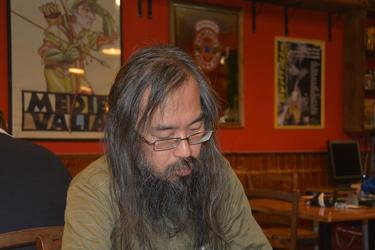 Takuji Kashiwabara at his 100th EGP tourney, Rome 2014
Takuji Kashiwabara at his 100th EGP tourney, Rome 2014
Takuji, when and how did you start to play Othello and when was your first EGP tourney?
I started playing othello as a child, which is nothing surprising for a Japanese. I started to play in competition in 1996 in France when I learned that there was such thing as a selection to French Championship in Lyon, a city which was just a little over an hour from my city by train. To my big surprise, I got qualified for the French Championship, and I think this qualification motivated me to play serious competitions.
My first EGP was Paris EGP in 1997, but of course, for me it was just another french tournament, although there were some international players. My first EGP outside France was Cambridge EGP in 1998.
You won the EGP 7 times. How many tourney victories and finals?
You can find the numbers in EGP statistic page (note: by Tom Schotte) of the wonderful website of Othello News...
What was your best Othello year so far and what was your sweetest victory?
Two difficult questions. The year when I made the most progress was indoubtedly 1999 : I won my first full-length tournament in France, my first international tournament, and got qualified for the World Championship for the first time (well at the time in France there were more players interested in playing at WOC than today, so it was not that easy). In terms of my overall performance over the year, it is really difficult to choose from 2001, 2002 and 2003. But if we are talking about my best performance in the WOC, it was 2005. In any case, that goes back too long time ago now.
The second question is also difficult to answer. There are number of victories of which I have been quite happy for different reasons. Basically you can be happy about your victory because you found a nice move that is not obvious, or because you trusted your intuition which turned out to be correct, or because you succeeded to plan really ahead, or because you learned something new (well this happens more often in games you lose than in games you win) during the game, or because you have had an occasion to apply a newly learned theory (or a theory that you knew for a long time but you hadn't had an occasion to apply up to then), or simply because the game had an important consequence, or maybe because the opponent was reputed to be strong. Now, I can find almost several games of which I am fond of in each category.
Let me mention a few of them:
Kashiwabara-Hidayat EGP Milano 2001 Match for the 3rd place
Kashiwabara-Kitajima WOC 2002 Playoff
Kashiwabara-Tamenori WOC 2005 Semi-final 2nd game
These three fit in more or less same category : I was in very difficult position, I had to think very hard to survive (actually during the game against Kitajima, somewhat I was optimistic), and when my opponents made the fatal error, I managed to stay calm and play the correct move in spite of the pressure I had. Well, you might be intrigued to see that I mention the pressure for a match for the 3rd place in an EGP tournament, but it happened to be the first game I played for a prize money...
I started playing othello as a child, which is nothing surprising for a Japanese. I started to play in competition in 1996 in France when I learned that there was such thing as a selection to French Championship in Lyon, a city which was just a little over an hour from my city by train. To my big surprise, I got qualified for the French Championship, and I think this qualification motivated me to play serious competitions.
My first EGP was Paris EGP in 1997, but of course, for me it was just another french tournament, although there were some international players. My first EGP outside France was Cambridge EGP in 1998.
You won the EGP 7 times. How many tourney victories and finals?
You can find the numbers in EGP statistic page (note: by Tom Schotte) of the wonderful website of Othello News...
What was your best Othello year so far and what was your sweetest victory?
Two difficult questions. The year when I made the most progress was indoubtedly 1999 : I won my first full-length tournament in France, my first international tournament, and got qualified for the World Championship for the first time (well at the time in France there were more players interested in playing at WOC than today, so it was not that easy). In terms of my overall performance over the year, it is really difficult to choose from 2001, 2002 and 2003. But if we are talking about my best performance in the WOC, it was 2005. In any case, that goes back too long time ago now.
The second question is also difficult to answer. There are number of victories of which I have been quite happy for different reasons. Basically you can be happy about your victory because you found a nice move that is not obvious, or because you trusted your intuition which turned out to be correct, or because you succeeded to plan really ahead, or because you learned something new (well this happens more often in games you lose than in games you win) during the game, or because you have had an occasion to apply a newly learned theory (or a theory that you knew for a long time but you hadn't had an occasion to apply up to then), or simply because the game had an important consequence, or maybe because the opponent was reputed to be strong. Now, I can find almost several games of which I am fond of in each category.
Let me mention a few of them:
Kashiwabara-Hidayat EGP Milano 2001 Match for the 3rd place
Kashiwabara-Kitajima WOC 2002 Playoff
Kashiwabara-Tamenori WOC 2005 Semi-final 2nd game
These three fit in more or less same category : I was in very difficult position, I had to think very hard to survive (actually during the game against Kitajima, somewhat I was optimistic), and when my opponents made the fatal error, I managed to stay calm and play the correct move in spite of the pressure I had. Well, you might be intrigued to see that I mention the pressure for a match for the 3rd place in an EGP tournament, but it happened to be the first game I played for a prize money...
|
KASHIWABARA Takuji 33 - 31 KATAJIMA Hideki WOC 2002 Amsterdam, playoff final 4 |
KASHIWABARA Takuji 34 - 30 TAMENORI Hideshi WOC 2005 Reykjavik, semi-final game 2 |
|
MARCONI Francesco 19 - 45 KASHIWABARA Takuji EGP Rome 2005 |
Here is one game involving "nice move" At the move 34, although other moves don't look very promising, 34 g2 is not so obvious move to play, especially because of the north edge: White gains one tempo in the north-east region, but Black then is likely to end up playing B1. The point is that in most variations, because of the wedging in h2, White will have another potential tempo in south-east region. Which is why the best move 35 for Black is e8 ?! |
|
Here is one in which "I learned something" The points are 34 e1 (well, this was the second time I played the move, but the continuation was different) together with 40 g2. If you only consider the north-east corner, 34 e1 will look like an extremely bad move. By flipping f2, White gives a tempo in g1 to Black, and by flipping g3, White throws away his own tempo in h2. But if you look all over the board, you see that h2 is not a tempo for white anyway, because of the stoner g7->h3, which is extremely difficult avoid. Furthermore, if Black takes back the edge, White then will have a quiet move in c6, and, the best part of the story is that g1 is not really a tempo, in a long term, for Black, because White will have a tempo at g2 in a near future. Of course, another question is whether one should play 40 g2 or 40 h7, since the north edge is quite attractive, and White will have more liberty to play around the corner a1 than Black around the corner h8. It has turned out that g2 is much better than h7, and in many cases in this kind of position g2 would be better. By the way, this game also happens to fall into another category, that is this is a part of the first best of three match ever I won. |
PENLOUP Dominique 23 - 41 KASHIWABARA Takuji EGP Brussels 1998 |
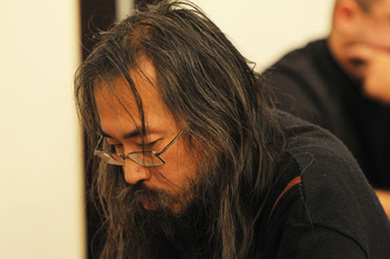 Takuji Kashiwabara, EGP Champion 2001, 2002, 2003, 2006, 2011, 2012 and 2013
Takuji Kashiwabara, EGP Champion 2001, 2002, 2003, 2006, 2011, 2012 and 2013
Is there 1 particular player in Europe that you learned a lot from?
I played against Manu Caspard at the first round of my first French Championship! After the game we left the room, took a board and he commented my moves, without the transcript sheet ! Several years later I learned that in Japan almost any good player can produce the transcript without the board, but at the time this impressed me a lot. Anyhow, he won the French Championship that year. The year I started in European Grand Prix (outside France), he was the winner of European Grand Prix, winning all four tournaments in which he took part. So you see, he was an othellistic hero for me. I replayed many times his games, thinking over possible variations and refutations etc.
Is there 1 particular player in Europe that you find hard to beat?
If I keep playing like I did in Cambridge and Rome this year, lots of players will be hard to beat for me :( More seriously I think currently I am having a huge loss streak against Michele Borassi.
Is there 1 particular city that you like to go to for EGP?
Difficult question. I usually like Prague and Copenhagen as the tournaments there are very well organised, Cambridge because I love the city, Paris because it is easy to go (I used to like Milan, Torino, Genova and Bruxelles for the same reason but there is no longer EGP tournament in these cities). Of course, I shouldn't forget Gouda, Hoorn, Amstelveen, Krakow, Gdansk, Stockholm...
Last year there were only 5 players that took part in 4 or more of the 2013 EGP tourneys. That is not a very solid base for such a prestigeous titIe as European Othello Champion. Is there a future for the European Grand Prix? What can be done to attract more players?
Well, I am aware what I say is not very diplomatic, but in my opinion there are simply too many tournaments in places that are far away. There are now tournaments in Athens and Moscow. When I started, there were 5 tournaments with best 3 results that counted, which was very reasonable. I think it would be better to reduce the number of tournaments, but not by letting each country organize one tournament once in three years instead of once in two years. One thing we could do, is to distinguish "central" countries and "peripheral" countries and each country in the central zone organize a tournament once in two years whereas others do, for example, once in four years.
I am sure you are eager to win the 2014 EGP too. How many hours do you spend studying Othello?
Not a lot this year. The results in the last two tournaments reflect this...
For the Othello rookies, is there a fast way to on the board succes?
Depending on what you call "fast". By dedicating ten hours a day to Othello, one will probably make seventy times as much progress as by spending an hour each week for Othello. Can we call it a fast progress?
Your best result at the WOC is a third place in 2005, Isn't it about time that the 7x European champion also takes the World title?
As I said before, at the moment I can't spend enough time for Othello this year, so I certainly will not win the World title.
Thank you very much Takuji for the interview and good luck!!!
Interview by Trees van Seggelen, April 2014
I played against Manu Caspard at the first round of my first French Championship! After the game we left the room, took a board and he commented my moves, without the transcript sheet ! Several years later I learned that in Japan almost any good player can produce the transcript without the board, but at the time this impressed me a lot. Anyhow, he won the French Championship that year. The year I started in European Grand Prix (outside France), he was the winner of European Grand Prix, winning all four tournaments in which he took part. So you see, he was an othellistic hero for me. I replayed many times his games, thinking over possible variations and refutations etc.
Is there 1 particular player in Europe that you find hard to beat?
If I keep playing like I did in Cambridge and Rome this year, lots of players will be hard to beat for me :( More seriously I think currently I am having a huge loss streak against Michele Borassi.
Is there 1 particular city that you like to go to for EGP?
Difficult question. I usually like Prague and Copenhagen as the tournaments there are very well organised, Cambridge because I love the city, Paris because it is easy to go (I used to like Milan, Torino, Genova and Bruxelles for the same reason but there is no longer EGP tournament in these cities). Of course, I shouldn't forget Gouda, Hoorn, Amstelveen, Krakow, Gdansk, Stockholm...
Last year there were only 5 players that took part in 4 or more of the 2013 EGP tourneys. That is not a very solid base for such a prestigeous titIe as European Othello Champion. Is there a future for the European Grand Prix? What can be done to attract more players?
Well, I am aware what I say is not very diplomatic, but in my opinion there are simply too many tournaments in places that are far away. There are now tournaments in Athens and Moscow. When I started, there were 5 tournaments with best 3 results that counted, which was very reasonable. I think it would be better to reduce the number of tournaments, but not by letting each country organize one tournament once in three years instead of once in two years. One thing we could do, is to distinguish "central" countries and "peripheral" countries and each country in the central zone organize a tournament once in two years whereas others do, for example, once in four years.
I am sure you are eager to win the 2014 EGP too. How many hours do you spend studying Othello?
Not a lot this year. The results in the last two tournaments reflect this...
For the Othello rookies, is there a fast way to on the board succes?
Depending on what you call "fast". By dedicating ten hours a day to Othello, one will probably make seventy times as much progress as by spending an hour each week for Othello. Can we call it a fast progress?
Your best result at the WOC is a third place in 2005, Isn't it about time that the 7x European champion also takes the World title?
As I said before, at the moment I can't spend enough time for Othello this year, so I certainly will not win the World title.
Thank you very much Takuji for the interview and good luck!!!
Interview by Trees van Seggelen, April 2014
